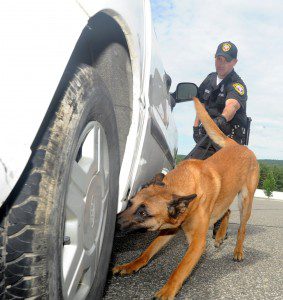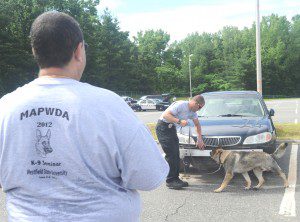
Thomas Krutka of the Southwick Police Department handles his K-9 partner, Jax, as the Belgian Malinois shepherd dog searches for marijuana secreted in a derelict car as part of a training and certification exercise staged on the grounds of Westfield State University last week by the Massachusetts Police Work Dog Association. (Photo by Carl E. Hartdegen)
Police dogs from New England and beyond gathered on the grounds of Westfield State University for annual certification and additional testing in the abilities they bring to police work.
Southwick’s K-9 officer, Thomas Krutka, under the auspices of the Massachusetts Police Work Dog Association, organized the week-long conference in the city for the first time.
Krutka said that 34 dogs representing 30 police departments came to the event.
“They came (from) as far north as Canada and south from South Carolina” he said.
He said that the WSU venue is an appropriate venue for the event, and since WSU is “one the top criminal justice schools in the country we thought it’d be nice to graduate dogs too.”
The recent event is the fourth to be organized by MAPWDA in the five-year history of the organization and Krutka took over the organizational duties because the officer who had staged the event for the past two years needed a respite.
“Liana Varosky, K-9 handler for UMass, she’s done it the last two years at UMass and she needed a break” he said.
In order to be useful in court, the dogs must be certified annually and the first three days of the conference were devoted to certification testing.
First the dogs must pass a rigorous police obedience test before they go on to specialized training.
“If you can’t control your dog, it’s unsafe to do anything else” he said.
Testing is done to North American Police Work Dog standards and, after the dogs qualify in obedience training, the five NAPWADA master trainers who participated in the event evaluated and certified the K-9 teams.
The dogs are trained and certified in several areas – obedience, narcotics detection, explosive detection, patrol duties, tracking, searching for persons, searching for evidence, suspect apprehension and handler protection.
“We try to wrap up the testing in the first three days,” Krutka said. But the trainers are available to help with dogs that failed a certification test to resolve any issues so the dog can be re-tested and certified.
After the certifications are done, he said “we get to take advantage of working with the master trainers” to solve problems a handler may be having with a dog.
“The master trainers are really incredible with dogs” he said. “They’re amazing. They can fix a problem with a dog in a matter of minutes.”
He pointed out that not all the dogs are trained and skilled in all the areas. For example, the bloodhound that came from the Williamstown police department is only used for tracking and other dogs may also be closely focused on only a few areas of law enforcement.

Peter Osowiecki of the Suffield (Conn.) Police Department evaluates a K-9 team, Officer Tony Castaldo and his German shepard dog, Zeus, as they seek hidden narcotics in a certification exercise staged on the grounds of Westfield State University last week by the Massachusetts Police Work Dog Association. (Photo by Carl E. Hartdegen)
Krutka said that his dog, Jax, is also a pet.
“When Jax comes home, the minute we walk through the door he turns into a pet. He lets his guard down, he’ll actually relax” Krutka said. But Krutka has to be careful not to allow him to learn bad habits.
He said that Jax, like all the dogs at the conference, is trained to work for a reward, his toy.
Krutka has a tug toy that Jax gets to play with briefly when he completes a task or finds narcotics.
“When he’s given a task, and he does it correctly, we get to play with the tug” he said. “I do not play with that tug any other time. Never. It’s only for work.”
Krutka said when dogs are selected for police work, evaluators look for their play drive. “If a dog doesn’t have a play drive, he’s not going to want to do the work. Jax’s play drive is through the roof. He will play 24/7. You have to ignore him after a while.”
And Krutka has to be careful how he treats Jax at home to be sure that a casually given cookie does not create a bad habit, which might conflict with his training for work.
So far that has not been a problem as Jax was recertified without any problems.
Krutka said that most of the teams were certified but a couple of dogs left with things to work on.
“It was a good week”, Krutka said.







